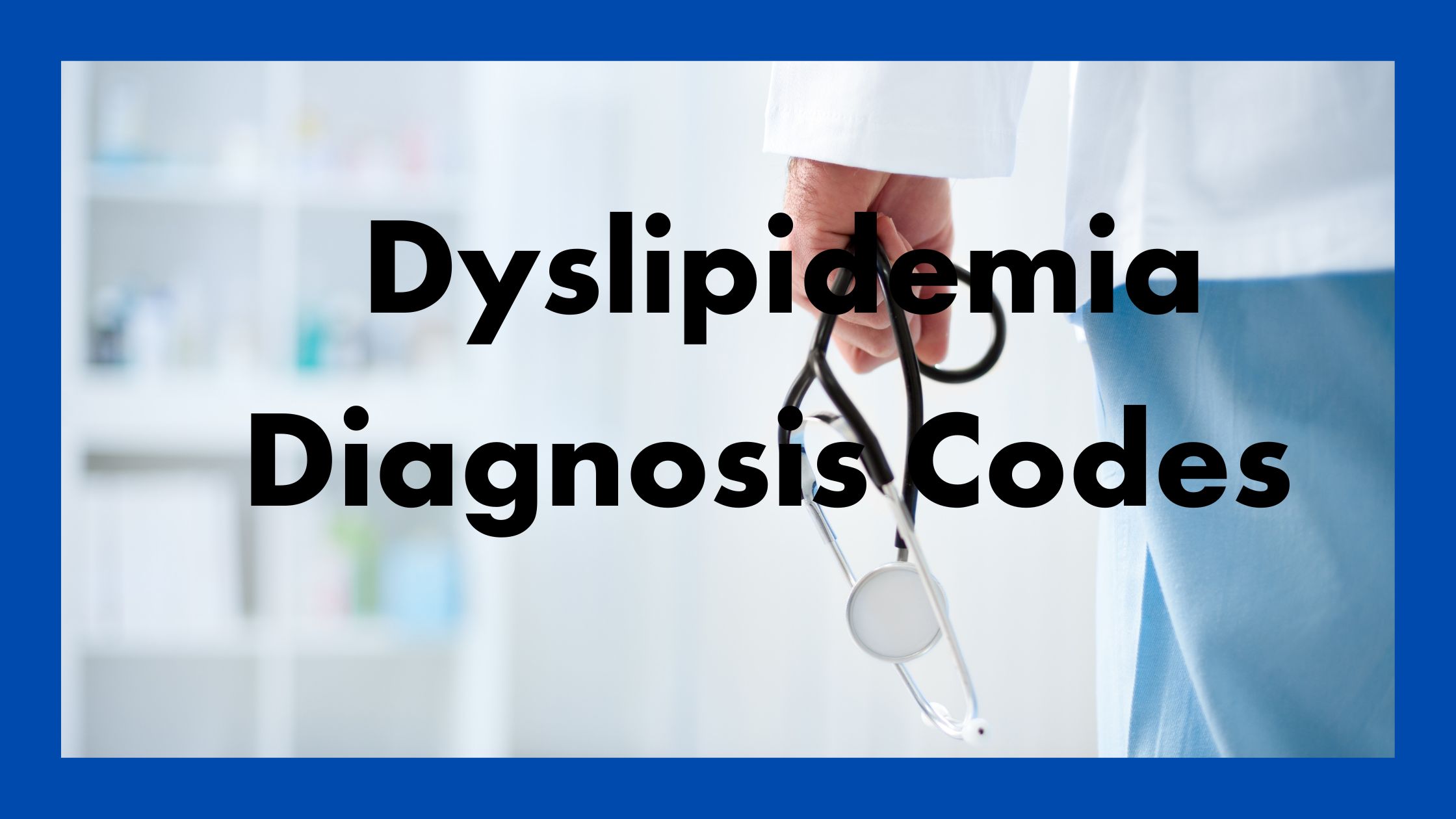Dyslipidemia occurs when there is an abnormal amount of cholesterol, fat and/or triglyceride levels in the blood.Dyslipidemia is a medical disorder characterized by abnormal amounts of lipids such as triglycerides and cholesterol in the blood. It can be caused by genetic factors, lifestyle habits such as poor diet or lack of exercise, obesity and many other medical conditions including diabetes, and medications such as steroids. Treatment may involve modifying the patient’s diet, such as limiting saturated fat and trans fat while increasing monounsaturated fat and polyunsaturated fat from sources such as fish oil.
List of Dyslipidemia ICD 10 Codes
- E78.0 Pure hypercholesterolemia: Elevated levels of cholesterol in the blood, not associated with other lipid abnormalities.
- E78.00 Unspecified pure hypercholesterolemia: High cholesterol levels without specifying the cause or type.
- E78.01 Familial hypercholesterolemia: A genetic disorder causing high cholesterol levels due to defective cholesterol metabolism.
- E78.1 Pure hyperglyceridemia: Increased glycerides (triglycerides) levels in the blood without significant elevation of cholesterol.
- E78.2 Mixed hyperlipidemia: A combination of increased cholesterol and triglyceride levels in the blood.
- E78.3 Hyperchylomicronemia: Elevated levels of chylomicrons, large fat particles, in the blood, leading to severe hypertriglyceridemia.
- E78.4 Other hyperlipidemia: Various other conditions characterized by abnormal lipid levels.
- E78.41 Elevated Lipoprotein(a): High levels of Lipoprotein (a), a specific type of Lipoprotein-associated with an increased risk of cardiovascular disease.
- E78.49 Other hyperlipidemia: Other types of hyperlipidemia not specified in the above categories.
- E78.5 Hyperlipidemia, unspecified: General diagnosis for elevated lipid levels without specifying the type.
- E78.6 Lipoprotein deficiency: The deficiency or absence of certain lipoproteins may be associated with specific genetic disorders.
- E78.7 Disorders of bile acid & cholesterol metabolism: Conditions affecting the metabolism of bile acids and cholesterol.
- E78.70 Disorder of bile acid & cholesterol metabolism, unspecified: General diagnosis for disorders in bile acid and cholesterol metabolism without specifying the type.
- E78.71 Barth syndrome: A rare genetic disorder characterized by abnormal cardiolipin metabolism, leading to various symptoms.
- E78.72 Smith-Lemli-Opitz syndrome: An inherited disorder affecting cholesterol synthesis, leading to developmental and physical abnormalities.
- E78.79 Other disorders of bile acid & cholesterol metabolism: Additional conditions affecting bile acid and cholesterol metabolism.
- E78.8 Other disorders of lipoprotein metabolism: Miscellaneous disorders related to lipoprotein metabolism.
- E78.81 Lipoid dermatoarthritis: A rare genetic disorder involving skin and joint abnormalities associated with lipid metabolism.
- E78.89 Other lipoprotein metabolism disorders: Other conditions affecting lipoprotein metabolism not specified elsewhere.
- E78.9 Disorder of lipoprotein metabolism, unspecified: General diagnosis for disorders of lipoprotein metabolism without specifying the type.
For check other ICD10 Codes please visist
Cases of Dyslipidemia:
Dyslipidemia is a condition characterized by abnormal levels of lipids in the blood. Common causes of dyslipidemia include genetic factors, as some individuals are more susceptible to high levels of cholesterol or triglycerides due to certain mutations in their genes that lead to improper production and handling of lipids.Following are some of the reasons for Displaymedia-
◆ Unhealthy lifestyle habits such as lack of physical activity can lead to dyslipidemia.
◆ Heavy smoking is one of the major factors of dyslipidemia.
◆ Poor and unbalanced dietary choices (such as those high in saturated fat and trans fat).
◆Excessive alcohol consumption can also contribute to a decrease in HDL cholesterol (the good kind) while increasing LDL cholesterol.
◆Chronic kidney disease and certain medications can also negatively affect lipid levels, leading to dyslipidemia.
Effects of Dyslipidemia on body
Dyslipidemia is a condition in which a person has abnormal levels of lipids in the bloodstream, including cholesterol and triglycerides. This can have a number of adverse effects on human health, increasing the risk of developing cardiovascular diseases such as heart attack and stroke; Further damage is often caused by plaque formation inside the walls of the vessels that supply blood to essential organs.
Additionally, dyslipidemia often leads to weight gain and insulin resistance, as well as changes in bone metabolism leading to a greater susceptibility to fractures. It is clear that dyslipidemia can have a significant impact on physical fitness.
Dyslipidemia may lead to further medical development, including coronary artery disease, stroke, diabetic complications, and atherosclerosis.
Symptoms of Dyslipidemia
Dyslipidemia is considered one of the leading causes of death and disability worldwide, especially due to its association with cardiovascular diseases, but its risks are reduced if early detection and preventive measures are taken. Start working for it, its symptoms are as follows-
◆Symptoms of dyslipidemia include fatigue, chest pain or discomfort, abdominal pain (especially after eating), etc.
◆ Swelling or stiffness in the feet can be a sign of Dyslipidemia.
◆ Increase in heart rate and irregularity in bowel movement can be included in its serious symptoms.
How to protect yourself from Dyslipidemia?
Dyslipidemia is a condition that can lead to serious health risks, including heart disease and stroke. Thus, to protect ourselves from dyslipidemia and its associated health hazards, it becomes extremely important to adopt a holistic approach that includes lifestyle and dietary changes as well as regular medical check-ups. With regard to lifestyle, increasing physical activity can help lower cholesterol levels and aid in weight management. Eating a nutrient-rich diet with plenty of fresh fruits and vegetables is also important for maintaining healthy cholesterol levels. Reducing the intake of saturated fat can help in controlling the amount of cholesterol present in the body.
In addition, regular checkups should be completed by your healthcare provider to monitor blood lipid levels, which will provide important information about your current risk status for developing dyslipidemia, thereby facilitating its diagnosis. By staying informed about your overall health through preventive measures like these, you can help protect yourself from the many dangers associated with dyslipidemia.
FAQ
Ans. If left untreated, dyslipidemia can lead to serious health complications such as heart disease, stroke, and peripheral artery disease.
Ans. Regular exercise; tobacco cessation; controlling related conditions or diseases; Medication for those considered at high risk for heart disease or stroke; The risk of dyslipidemia can be reduced by weight management through reduction in caloric intake and/or by appropriate caloric intake.
Conclusion
From today’s post, we have come to know what is Dyslipidemia, its causes and symptoms, in addition to this, we have learned how to protect ourselves from Dyslipidemia and how it affects the body. Actually, Dyslipidemia is not a disease but a disorder caused due to increased amount of lipids in the blood, which can be cured by making changes in your daily routine, but it brings with it many heart related diseases, so if home remedies If you do not get relief from this, then definitely consult your doctor. We hope that through today’s post all your questions related to Dyslipidemia would have been answered, if you still have any confusion, then do ask in the comment box.
Related Articles:
List of Modifiers in Medical Billing (2023) |HCPCS Modifiers (AtoZ)
(2023) ICD-10-CM Dx Code Z13.220 | ICD-10 Code For Lipid Panel


